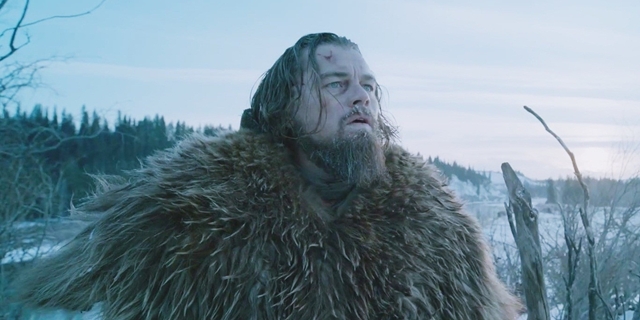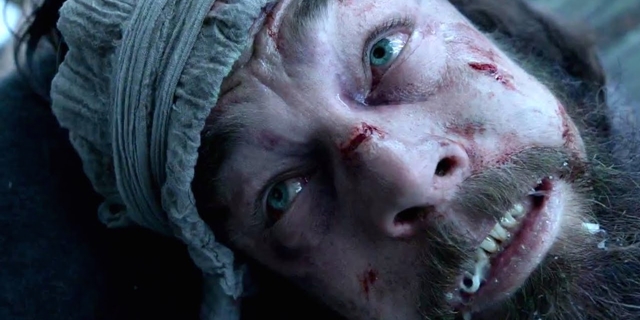After the Oscar nominations were announced, and with the hashtag #OscarsSoWhite beginning to trend once again for the second year in a row, I found myself reeling from a kind of open wound. My inexplicable, unconditional love of Awards season was at war with my frustration over its politics and its lack of diversity. Every year I try and find something specific to be excited about. This year, it was the fact that Mad Max Fury Road–a popular, sci-fi action film with feminist overtones–was miraculously (but deservedly) nominated for 10 Academy Awards including best picture. Things like that give me a glimmer of hope.
But then, I saw The Martian and The Revenant. And both movie-watching experiences were like pouring salt into that open wound.
Both films are well made, yes– they’re good movies, no question about it. Both boast stellar visuals and other smart, sophisticated filmmaking choices from respective directors Ridley Scott and Alejandro González Iñárritu, both of whom I deeply respect and admire as filmmakers. As the final credits rolled for each film, though, I asked myself two questions, the same two questions I always ask myself as a movie-watcher these days: was the movie good, and did I like the movie.
Objectively and technically speaking, these movies are fantastic pieces of cinema, I will reiterate. Except for one thing, which I see as a true fault: these films, try as they might have, did not move me.

Both films felt empty and numb, almost vacuous. Rather than making us care about the protagonists on the basis of their humanity, likeability, and/or relatability, the films instead rely almost exclusively on showy and spectacular cinematic mastery of everything surrounding these main characters. The humanity of the films becomes lost in the shuffle, reduced to tiny blips in the greater, grander scheme of what external obstacles the men face in favor of focusing on those obstacles. These main characters become empty shells as a result; just pawns moved around in unforgiving landscapes, manipulated within impossible situations. Those situations are what drive us to care about these men–but it was not enough for me, and it only further emphasized and problematized the fact that it is white masculine bodies that are suffering on screen.
So, the movies both attempt to make us care about characters based solely on their plights, and these characters are white men who we are asked to care about and follow on their respectively difficult, solitary journeys. These characters should have warranted more curiosity, sympathy, and discovery on our part–maybe I wanted them to grow more or learn something from their trials, but both films end on hazy, ambiguous notes when it comes to ending any kind of arc.. And yet, their status as white males, when combined with the technical artistry and overall quality of these two films, make up for these characters’ lack of depth and complexity in the eyes of the Academy. And that, to me, is troublesome.
Realistically, there was very little opportunity given to these characters within the span of their respective stories to exhibit much personality. It is not the fault of the actors, nor the flaw of either screenplay. The crux of each story is simply the protagonist in a battle against larger factors, like a fixed point around which chaos and crisis orbits. The films do well exploring those orbits–but I wanted to know more about the fixed points, otherwise why do we care about the extremity and intricacy of the chaos enveloping them in the first place? Matt Damon as Mark Watney in The Martian is witty, snarky and smart. He shows a range of emotions–from realization and acceptance to fear and anger. All in all, Damon is dynamic to watch as a man left behind on Mars. Then there is Leonardo DiCaprio as Hugh Glass in The Revenant. I watched the film unfortunately tainted by so many stories of the horrendous, grueling film shoot he endured, wondering how much acting he was really actually doing. I tried to read the nuances of Leo’s facial expressions and attempted to glean meaning from his manly, pained grunts.

The Martian relies upon those humorous lines and snappy delivery by Damon to show us that he is a good guy and an admirable individual. The film assumes that that is enough to make us feel compelled and gripped by his struggle to survive on his own on Mars, and we are meant to feel elated by his eventual rescue. The Revenant relies upon brutal but at times beautiful imagery of the wilderness and spiritual, stylized flashbacks and hallucinations that DiCaprio’s character experiences (many of which feature his deceased wife). The film assumes that every obstacle he faces in the wilderness, especially juxtaposed with these intensely metaphysical, philosophical codas that include his wife whispering a Native American anecdote about strength, are enough to make us feel compelled and gripped by his struggle to survive on his own in the wild, and elated by his eventual return to enact revenge on the man who’d killed his son and left him to die in the first place.
By the end of the films, I knew these men’s plights but did not know these men. There is nothing that the films could have done better per se; actual flashbacks might have distracted from the goals of the films, and the structures would certainly have suffered for it. Flashbacks are often cheesy, and The Revenant’s answer to that is to make them short, simple, and ethereal in nature, more like glimpses and visions than whole memories of events. And exposition or longer sequences of set up would have failed for the same reasons–The Martian packs a punch because we’re dropped right into the situation that leads to Watney’s abandonment on Mars.
So with all of that said, I don’t know that I can offer any potential solutions. I can, however, remark upon why these characters are so engaging to the Academy. Damon and DiCaprio are always turning in great performances, but I think the Academy loves the white man’s plight; white man against the odds, against the wild, against the unimaginable. None of this bothered me quite as much until I watched Beasts of No Nation. It was a strange sort of triple-feature. After having seen The Martian and The Revenant, I was completely in awe of this story, which is told from the perspective of a child soldier in Africa named Agu. I was mesmerized by Idris Elba in particular, whose character, only ever referred to as Commandant, is just as mysterious. Yet I found his performance to be more hypnotic than anything Damon and DiCaprio were asked for or expected to do within their buzzworthy roles. I did want to know more about him. I wanted to understand his hubris and his ego, to analyze his choices, to speculate upon his background, and to observe every nuance of his performance. His performance was interesting because the character was not a white man facing immeasurable, interchangeable hurdles, but rather an African man who was a leader and a manipulator and a selfish, charming, terrifying figure. He did not fit into the character types often played by Oscar-nominated actors of color. He was not the fixed point in an orbit but rather he was a gravitational pull circling young protagonist Agu and likewise, the audience is pulled in by his sheer force. We are immersed in the sad, scary world of an unspecified African civil war thanks not only to Cary Fukunaga’s stunning camerawork and haunting script–but also because of how three-dimensional Elba’s character felt, even while we knew so little about him.

Maybe this is all a matter of lived experience, or rather, viewed experience; maybe it was my hunger for diverse stories, diverse characters, diverse actors, diverse points of view, and diverse struggles on screen dictating how I viewed these three films. Beasts of No Nation gave me everything that The Martian and The Revenant had not. But that satisfaction was somehow bittersweet. More salt in my open wound was the realization that Damon and DiCaprio, no matter how great their performances were, got nominated for theirs while Elba did not for his. More salt in my open wound was wondering (having not seen the other performances nominated in the Best Actor category, I should add) whether the other nominees were deserving of their spots, and why Elba could not have been nominated in their place. More salt in my open wound was thinking about the fact that Beasts of No Nation was one of many films that was deserving of Academy Award attention this year that had gotten snubbed, and feeling like I had somehow failed by not seeing those movies instead of (or at least in addition to) The Revenant and The Martian. I can change my viewing habits and seek diverse content. And I can hope that the Oscars are not “so white” next year. If these three movies have taught me anything, it’s that I am tired of seeing the same old stories–even if they are told in interesting or visually astonishing ways–about white men and their burdens. I’m ready to see other kinds of stories. Maybe the Academy will be too.

